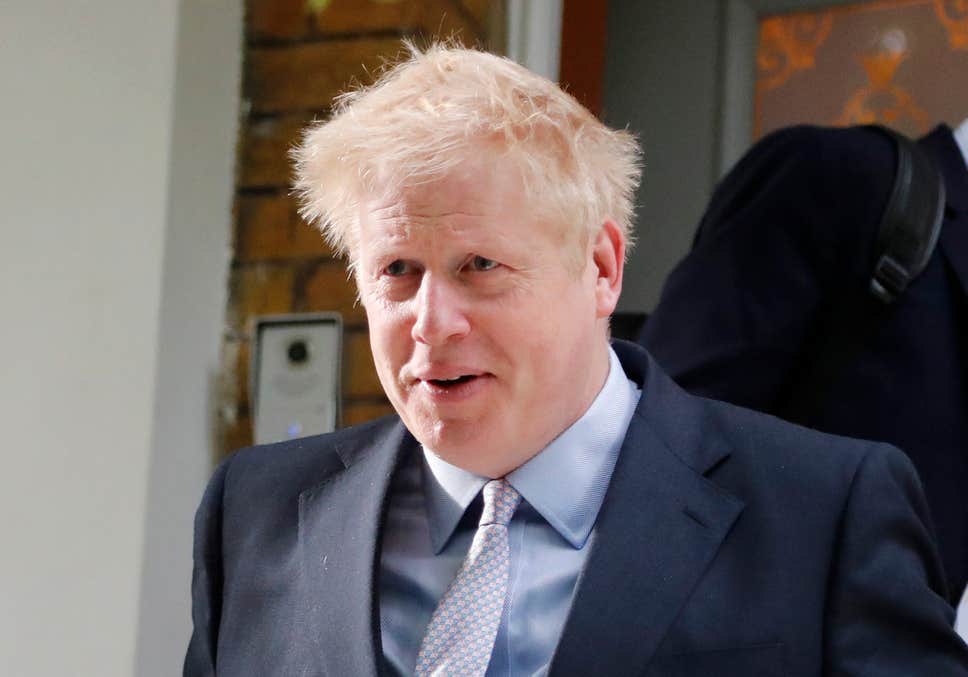UK's Johnson heads for big win in 'Brexit election

Agency
December 13, 2019

LONDON–Prime Minister Boris Johnson said Friday that voters had given his government a "powerful new mandate" to take Britain out of the EU next month, as he headed for victory in a landmark election.
With about 600 of 650 seats declared, Johnson's Conservatives secured the 326 seats required for a majority in the House of Commons, gaining 43 seats, while Labour lost 55 to 197, the BBC reported.
The Tories were heading for their biggest majority in parliament since the heyday of Margaret Thatcher in the 1980s, according to exit polls and partial results.
The pound jumped by about two percent against the dollar on hopes that Johnson would deliver his promise to "Get Brexit Done" after years of political deadlock over Britain's future.
With a large majority of MPs, he will be able to get the divorce deal he struck with Brussels through parliament in time to meet the next Brexit deadline of January 31.
Ratifying the deal would formalise the end of almost five decades of EU-UK integration, although both sides still need to thrash out a new trade and security agreement.
France's European affairs minister, Amelie de Montchalin, was the first EU politician to welcome the indications of "a clear majority, something that has been missing in the United Kingdom for several years".
It signals a huge victory for Johnson, a former London mayor and foreign minister who helped lead the Brexit campaign to victory in the 2016 EU referendum.
Speaking as he was re-elected as an MP in west London, Johnson said: "It does look as though this One Nation Conservative government has been given a powerful new mandate to get Brexit done.
"And not just to get Brexit done, but to unite this country and to take it forward and to focus on the priorities of the British people." At his own re-election for the 10th time as an MP, veteran Labour opposition leader Jeremy Corbyn, 70, admitted it had been a "very disappointing night".
He said he would be stepping down after a period of "reflection", and would not be leading the party into the next election, which is due by 2024.
In another major upset, the leader of the anti-Brexit Liberal Democrats, Jo Swinson, lost her seat in western Scotland to the Scottish National Party (SNP). -
Labour collapse -
The Conservatives had been ahead in opinion polls for weeks but the scale of their victory, after a wet and windy winter election, was unexpected.
The party took a string of traditionally Labour seats in northern England and Wales that had not voted Tory for decades, many of them enticed by Johnson's Brexit pledge.
An exit poll pointed to a Conservative majority of 86, the best result since Thatcher was in Downing Street in 1987, although the final result could be lower.
By contrast Labour, under the leadership of committed socialist Corbyn, was initially projected to win just 191 seats -- its worst result since 1935.
Corbyn had promised a second referendum on Brexit, in a bid to appeal to half of British voters who still want to stay in the EU. But he had focused Labour's campaign on a radical programme of economic change, including re-nationalising some key industries, which failed to woo traditional voters.
Speaking in the early hours of Friday morning, Corbyn defended his "manifesto of hope" and maintained his policies were "extremely popular" during the campaign.
But he said: "Brexit has so polarised and divided debate in this country, it has overridden so much of a normal political debate." Corbyn is personally unpopular and dogged by accusations of sympathising with proscribed terror groups and failing to tackle anti-Semitism within the Labour party.
This is Labour's fourth successive electoral defeat -- and the second under Corbyn -- which could see the party out of power for another five years.
- Softer Brexit? The anti-Brexit Liberal Democrats also had a tough night, losing Swinson and projected to win just 13 seats, only one more than in 2017. Swinson had already faced criticism for failing to capitalise on strong European Parliament elections earlier this year.
Her campaign to reverse Brexit without even a new referendum was unpopular, while efforts to create a "Remain" alliance to stop Brexit failed.
Nigel Dodds, the British parliament leader of the Democratic Unionist Party which propped up the Tories under Johnson's predecessor Theresa May, lost his seat in North Belfast.
By contrast the Scottish National Party (SNP), which wants to stop Brexit and deliver an independent Scotland, was forecast to win 55 of 59 seats available.
If anti-Brexit parties failed to work together, the same is not true of their rivals.
Eurosceptic leader Nigel Farage claimed to have boosted Johnson's chances by declining to stand candidates for his Brexit Party in Tory-held seats.
The Brexit Party, like its former incarnation UKIP, is not predicted to win any seats, however. Johnson has promised to put his Brexit plan to parliament before the Christmas break, although it will not likely be ratified until January. He has then just 11 months to agree a new partnership with the EU before a post-Brexit transition period ends in December 2020. But with a comfortable majority in parliament, analysts note he could choose to extend that time and negotiate a closer trade deal than previously envisaged.
"Ironically, this is a freer hand for Johnson to negotiate a softer version of Brexit," said Simon Hix of the London School of Economics.


Leave Comment